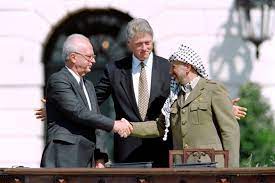Khaled Abou Zahr
A clip of a French journalist who had covered the First Intifada in Gaza when the peace accords were signed in Washington went viral recently. In the video, he stated that, at the moment Yitzhak Rabin shook hands with Yasser Arafat on the lawn of the White House in September 1993, screams of happiness were heard and that he saw with his own eyes Palestinian kids run toward Israeli soldiers, hug them and celebrate together.
There are a lot of symbols in this moment. It was a time of hope for a better future for Palestinians, Israelis and the entire Middle East. Today, we feel that all these achievements have been lost. Those accords had engines fighting for peace, such as Rabin. It is understandable, on revisiting his biography, why he had the power and capacity to be accepted by both Israelis and Palestinians.
Rabin’s military and political careers were marked by a hawkish position that helped him win the Israeli public’s trust, meaning he could make the necessary concessions while not sacrificing security. In the 1992 general election, one of the main issues that swung the vote in favor of Rabin and his party was the will and demand of the Israeli people to pursue peace. On the other hand, many Palestinians knew him as a man of his word who was capable of delivering on his commitments.
In order to achieve peace, Rabin stopped establishing new Israeli settlements in the Occupied Territories. And his administration engaged in covert talks with the Palestine Liberation Organization that resulted in the September 1993 Oslo I Accord, in which Israel acknowledged the PLO and committed to granting Palestinians in the West Bank and the Gaza Strip partial self-rule over time. This landmark moment had its opponents on both sides, with major protests taking place in Israel. With Arafat having recognized Israel’s right to exist and renounced terrorism, it was at that time that Hamas became the only significant armed Palestinian group sponsored by the regime in Tehran.
This accord and historical moment, the French journalist states in the viral clip, brought an end to the First Intifada. One must remember that, at that time, the intifada was not militant in nature. Palestinians did not attack innocent civilians. It was Palestinian children with rocks that made the difference. These small rocks proved to be very powerful and they empowered Arafat in his negotiations. Unfortunately, this was all short-lived and the 1995 assassination of Rabin by an extremist Israeli proved to be the final nail in the coffin of the Oslo peace process and the Palestinians’ progress toward the two-state solution. At the same time, we witnessed the beginning of the rise of Hamas and its violent terrorist attacks. The rise of extremists on both sides had started.
Beyond a last small window of hope under the Clinton administration with the 2000 Camp David Summit between Arafat and then-Israeli Prime Minister Ehud Barak, peace became a mirage. At that time, Arafat was weakened domestically and Barak was not able to project confidence, despite his military background. The Second Intifada started a few months later after Ariel Sharon’s provocative visit to Al-Haram Al-Sharif.
It was with the Second Intifada that Hamas rose in prominence and it eventually won legislative elections in Gaza in 2006. Since then, between a divided Palestinian leadership and the electoral musical chairs in Israel, no real peace has been possible. As the war in Gaza continues to spill blood and tears, we need courageous leaders on both sides to bring this conflict to an end. A real end. I believe this can only start in Israel. Tel Aviv needs a new Rabin. It needs a new leadership that can effectively protect its citizens, while ending the occupation and empowering the Palestinians toward their own rightful sovereignty.
Benjamin Netanyahu has failed his citizens. He was not able to protect them on Oct. 7. This will bring a dark end to Netanyahu’s political and military career. The man who promised he would never compromise on Israel’s security saw, on his watch, the worst terrorist attack by Hamas, with an unimaginable and horrific death toll. There needs to be a new and different approach emanating from Israel – or maybe, in this case, an old one. As we say in France, it is in the old pots that we cook the best soups. Just as Ronald S. Lauder wrote in Arab News last week, we should not give in to the voices of extremism and a two-state solution needs to be put forward now. It is what Arab countries have pushed for since 2002 with the Arab Peace Initiative.
Rabin famously said: “We must fight terrorism as if there is no peace process and work to achieve peace as if there is no terror.” In short, he empowered Arafat. He strengthened his peace partner. Rabin made real and difficult concessions so that peace with the Palestinians could become achievable. In turn, he faced his own side’s extremists. For now, the enemies of peace seem to be winning. Let us hope this will soon change.







